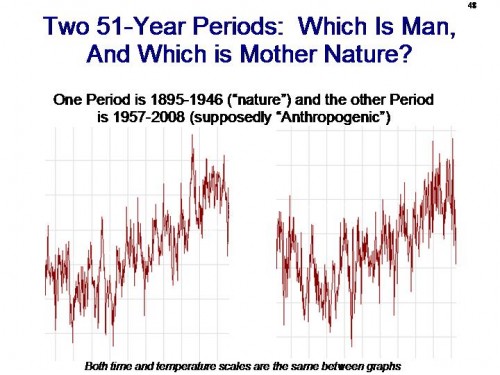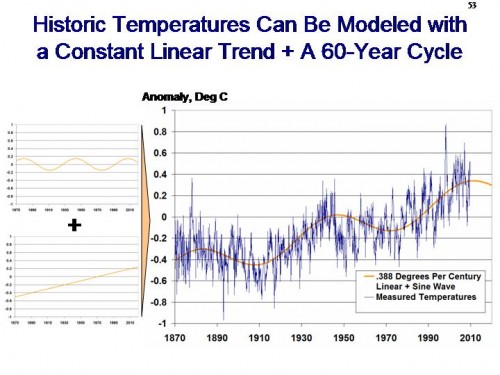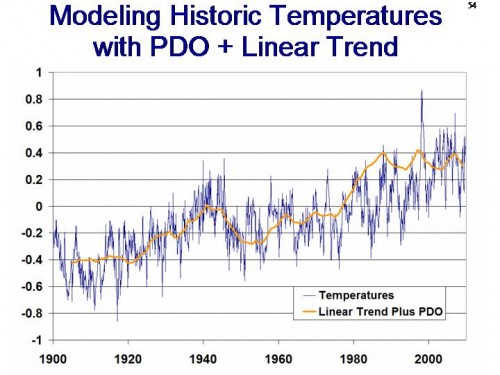I am a bit late on this (I have family over for the weekend) but on the off chance you have not seen it, make sure to check out the notes from the interview of Phil Jones of the CRU. Here is the BBC Q&A. Anthony Watt has as good a summary as anyone.
Anthony summarizes as follows:
Specifically, the Q-and-As confirm what many skeptics have long suspected:
- Neither the rate nor magnitude of recent warming is exceptional.
- There was no significant warming from 1998-2009. According to the IPCC we should have seen a global temperature increase of at least 0.2°C per decade.
- The IPCC models may have overestimated the climate sensitivity for greenhouse gases, underestimated natural variability, or both.
- This also suggests that there is a systematic upward bias in the impacts estimates based on these models just from this factor alone.
- The logic behind attribution of current warming to well-mixed man-made greenhouse gases is faulty.
- The science is not settled, however unsettling that might be.
- There is a tendency in the IPCC reports to leave out inconvenient findings, especially in the part(s) most likely to be read by policy makers.
I think some of these conclusions are a bit of a reach from the Q&A. I don’t get the sense that Jones is abandoning the basic hypothesis that climate sensitivity to manmade CO2 is high (e.g. 3+ degrees per doubling, rather than <=1 degrees as many skeptics would hypothesize). In particular, I think the writing has been on the wall for a while that alarmists were bailing on the hockey stick / MWP-related arguments as indicative of high sensitivities.
The new news for me was the admission that the warming rate from 1979-present is in no way unprecedented. This is important as the lead argument (beyond black box “the models say so” justifications) for blaming anthropogenic factors for recent warming is that the rate of warming was somehow unprecedented. However, Jones admits (as all rational skeptics have said for some time) that the warming rate from 1979 to today is really no different than we have measured in other periods decidedly unaffected by CO2.
I have made this argument before here, with the following chart:
Again, from Anthony:
Period Length Trend
(Degrees C per decade)Significance 1860-1880 21 0.163 Yes 1910-1940 31 0.15 Yes 1975-1998 24 0.166 Yes 1975-2009 35 0.161 Yes
Here, by the way, was my attempt to explain the last 100 years of temperature with a cyclical wave plus a small linear trend (my much more transparent and simple climate model)
Not bad, huh? Here is a similar analysis using a linear trend plus the PDO




A linear trend + cyclical component does in no way “explain” recent temperature changes. At best it describes them.
Yes, the Anthony Watt summary has some problems. For example, Jones admits that there has been no “statistically significant” warming since 1998. Then Watt drops the important word “statistically” and states that there has been no “significant” warming since 1998, which in common parlance means something quite different than what Jones said.
By the time we get to the first comment to Watt’s post, the story has become that Jones admitted there was “no global warming” at all since 1998.
Pretty sloppy work. (And BTW I find your site to be much better.)
In general I thought Jones came off pretty well in the interview. It made him seem like someone you could have an honest debate with. And if he has to constantly deal with people twisting his words like Watt and his commenters, I can see why he’d be tempted to get a little impatient sometimes. This is not to excuse the lapses at CRU.
Great site. I will refer to your stuff in the future. I am always amazed by the emotional and absurd reactions I get when I tell people I don’t believe in what is still a matter of scientific enquiry. Surely if scientists aren’t sure, I’m allowed to be unsure!
http://www.harrykey.com/blogs/climategate-uturn-no-warming-since-1995/
If there has been no statistically signficant warming in the past 15 years or so, then there has been nothing to justify the incredible amount of money and political capital spent on Rio, Kyoto, Bali and Copenhagen.
Whining about the difference between ‘statitically insignificant’ and ‘nothing’ is nothing but sour grapes.
Once again, the apocalyptic batting average is 0.000.
Rational people will lern from the rise and fall of this popular mania, and look for real problems to solve. And apply healthy doses of sktptical and critical thinking skills.
Those who are weak minded, needing authoritarian solutions to intellectual problems, will parse what was said, make heroic rationalizations, and pretend nothing has been done to falsify the AGW theory of climate catastrophe caused by CO2.
You guys are fucking morons. Go suck yourselves off.
@Incredible: Excellent point, your well reasoned analysis incontrovertibly proves the need for governments around the world to attempt coordinated management of Earth’s climate.
Also, to Coyote/Climate Skeptic, his last name is WattS with an S, I’ve seen you call him Watt lots of times.
The wisdom of our host’s policy irt trolls is proven to spot-on.
I like the charts. I just finished a little video along some of these lines at youtube a couple of days ago:
http://www.youtube.com/watch?v=6QfP291qgag
Some of you might be interested in the Central England record plotted in a similar manner – something I haven’t come across elsewhere.
The best thing I’ll say about it is that it will only take 2 minutes out of your life!
If the findings of Chiefio and others turn out to be true, yourwave will be flat instead of ascending!!!
Any chance you could try fitting your sinus+linear model to a bit longer time?
The reason I ask is because I’m fairly certain that if you do that you will find that the linear part you used for this model is actually just a derivative of a much larger, longer period sinus as well.
As its currently shown I wouldn’t be surprised if you already gotten a “That constant increase proves that co2 increases heat!” already, or something like that.
I suppose one could simply try to fit a sinus curve to become almost linear to still fit your fit, and then after that go back and see if perhaps it fits with older history records as well?
Perhaps I should have mentioned that if you do succeed in showing the temperature fits using 2 sinus curves, you get a much better argument for Natural Variability than what you currently have with 1 sinus and 1 linear, which appears to show the temperature will just keep rising.
I find it unsettling how you carefully pick apart the precise answers of Phil Jones. First, you cannot make the claim (as nearly every skeptic news source has made) that Jones admits that no warming has occurred in the past 15 years. He only states that we fall just short of the 95% confidence of change, something that would only happen if the temperature change was extreme. It falls just short of that. The real data shows that we have had global temperatures increase at a rate of .161 per decade. That is not that far away from the predicted .2 per decade as forecast by the IPCC. That difference is nothing to celebrate. In the mean time, global sea temperatures continue to soar and reached an all time high last year. Even data from as recent as last month show a continued escalation of temperatures to unprecedented highs.
Jones makes good points that we have no other identified cause for the warming over the past three decades. For the first time in human history, we have observations of solar inputs and volcanic activity that could influence the climate. As most skeptics say, the sun is the source of all warming and the sun is actually in a period of slightly reduced temperature forcing. Without some other influence, our temps should be in decline.
Even if hyperbolic scenarios such as those concocted by Al Gore–a man well known to dissemble–for his docu-fiction movie, AN INCONVENIENT TRUTH, turned out to be real, it would nevertheless be a foolish mistake to turn to governments and laws to deal with the so-called problem of global warming. The congress of the US, as but one example of blundering “democratic political leaders,” cannot even manage the federal budget, over which their control is unquestionable. How in the name of Elmer Fudd does anyone of sound mind think that governments can “manage” the earth’s climate? If the scientific community wants to be credibly received, it had better stop addressing its message to heads of state and begin talking reasonably and temperately to the only people who are capable of doing something positive to counter global warming–you and me. So far, by my way of thinking, the skeptical scientists are ahead of the GW scientist in presenting their opposing views because they don’t pretend, as most GWs do, that “the science of climate change is settled.” One need only read a few of the rational dissents by recognized scientists to know that the GWs are obviously lying about the science being settled. And if they would lie about that in the face of the many dissenting scientists, what won’t they lie about? Furthermore, the fact that so many GW scientists are on the government dole in one way or another makes everything they say suspect. What is needed is a First-Amendment-type wall of separation between science and the state, and between educational institutions and the state.
I don’t either, but he does seem to be conceding it’s less proven than he and his associates have been implying.
Everyone agrees that having industries spewing polution into the atmosphere, rivers and oceans is not a good thing. From this follows that there is an environmental and health cost associated with almost any production which relies on fossil fuel as energy. A global tax on burning fossil fuel would very quickly solve the problem. This tax could change the economics of energy use and induce industries to develop cleaner and potentially cheaper energy. The free market will solve the problem, however, if there is no government intervention, the market will kick in too late, after the damage has been done.
Micahel E writes:
“Jones makes good points that we have no other identified cause for the warming over the past three decades.”
Isn’t this just another a form of the argument that “because I can’t think of what else it might be, that light I saw in the sky must be an alien visitor from another planet?”
“For the first time in human history, we have observations of solar inputs and volcanic activity that could influence the climate. As most skeptics say, the sun is the source of all warming and the sun is actually in a period of slightly reduced temperature forcing. Without some other influence, our temps should be in decline.”
How has Phil Jones established that there are not other influences? This is my fundamental criticism of all climate science, to date. That, and that there’s a decided lack of historical perspective upon which to draw climactic conclusions.
On the later, with solar data collection, we get into a redux of some of the same problems that plague modelers already. To wit, they lack accurate global historical data, which leads to lack of understanding about natural variability. This lack of understanding is real, and it SHOULD make all unequivocal pronouncements about climate highly suspect. Our lack of historical perspective (not to mention the incredible hubris, not to mention the outright fraud surrounding the now infamous proxy data) undercuts science’s ability to make sweeping, long term claims about climate change (accurate ones, anyway).
With solar ouput data, now, as with actual global temperature data collection, we only have had accurate data for a short duration. With such a short span of collection, how can we say we know what part of the climate’s variability is natural, due to Solar changes. I don’t think “we’re” ready to say anything about that, yet.
We know for certain that climate models are imperfect simulations of nature, only “validated” after comparing their results with actual measurements after the fact. We haven’t been at this very long, and climate is a very complex and chaotic beast.
As for the former idea that “we can’t explain it in any other way,” I’d like to offer up a few ideas.
Have we measured and unequivocally established the capacity of the heat sink that is the Earth during periods in which the Sun is relatively more active? Heat sinks dampen temperature gains for a while, but then, if they reach saturation, release that energy after some period. If the Earth is such a heat sink (and I think it’s reasonable to assume that it is), this would moderate heating and cooling during periods of a more or less active Sun. If there is a heat sink action going on, what is it’s period? What is the saturation point?
How long a period would it take before actual measurements could disprove that such a heat sink uptake period exists? If we found that the oceans stored heat for 30, 40, or 500 years before releasing it, couldn’t that (at least partially) explain cause of some of the measured warming of the late 20th century, if one assumed that the Sun was more active in the 1st half of the century? But what do we know about the Sun’s output 100 years ago?
Another hypothesis is that natural variability might center around major volcanic activity as the primary dependent variable. With major volcanic eruptions, we cool due to the atmospheric dust. Without such eruptions, the Earth naturally warms up. And it seems that we’re in a fairly long period with only a few major, explosive, eruptions (Mount St. Helens, Pinatubo, et. al in the past thirty years). Has anyone modeled this correlation? What if we’re just seeing lack of major volcanic eruptions, and that’s why we’re warming?
Or, what if the magnetosphere is playing a large, but unmodeled, role in the Earth’s natural heat exchange variability? I don’t believe any of the models are currently concerned with that, are they? Maybe, in the periods of weak magnetism in the Van Allen belt, more high energy particles might hit the Earth, even if the Sun’s output is slightly less? I’m under the impression that the magnetic poles are moving, perhaps in preface to the periodic natural shifting that we know has occurred many times throughout geologic history. What if those poles weakening and shifting around means some added energy strikes the Earth? If so, how much could that be warming us up?
I’m not saying any of my ideas here are true. I’m only trying to point out just how perilous it will be to argue that because you couldn’t think of anything else, it must therefore be the humans who are responsible.
You can tell which period is which in the picture titled “Two Fifty-One Year Periods: Which Is Man, And Which Is Mother Nature’. It’s obviously the first one. You can see that after 1998 temperature remains stagnant and this happens in that chart.
@ Rick – nice video presentation. Thanks!
I tried to download a copy but it was ‘unable to download’ – is this a user restriction – or something to do with youtube?